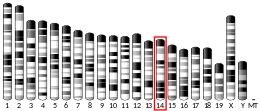MYCBP2
Probable E3 ubiquitin-protein ligase MYCBP2 also known as myc-binding protein 2 or protein associates with myc (PAM) is an enzyme that in humans is encoded by the MYCBP2 gene.[5][6]
Structure
PAM contains a N-terminal leucine zipper, central MYC-binding, and C-terminal histone-binding protein homology domains.[5]
Interactions
MYCBP2 has been shown to interact with Myc.[5]
gollark: Like <@!151391317740486657> .
gollark: Well, back when I was advertising it to new users, lots complained that they could not solve such a hard maths problem and stuff.
gollark: They complain lots.
gollark: Yes.
gollark: Though given that many people apparently can't even run the uninstaller thing most potatOS users probably can't manage bypassing even that.
References
- GRCh38: Ensembl release 89: ENSG00000005810 - Ensembl, May 2017
- GRCm38: Ensembl release 89: ENSMUSG00000033004 - Ensembl, May 2017
- "Human PubMed Reference:". National Center for Biotechnology Information, U.S. National Library of Medicine.
- "Mouse PubMed Reference:". National Center for Biotechnology Information, U.S. National Library of Medicine.
- Guo Q, Xie J, Dang CV, Liu ET, Bishop JM (Sep 1998). "Identification of a large Myc-binding protein that contains RCC1-like repeats". Proc. Natl. Acad. Sci. U.S.A. 95 (16): 9172–7. doi:10.1073/pnas.95.16.9172. PMC 21311. PMID 9689053.
- "Entrez Gene: MYCBP2 MYC binding protein 2".
Further reading
- Nakajima D, Okazaki N, Yamakawa H, Kikuno R, Ohara O, Nagase T (2002). "Construction of expression-ready cDNA clones for KIAA genes: manual curation of 330 KIAA cDNA clones". DNA Res. 9 (3): 99–106. doi:10.1093/dnares/9.3.99. PMID 12168954.
- Nagase T, Ishikawa K, Suyama M, Kikuno R, Hirosawa M, Miyajima N, Tanaka A, Kotani H, Nomura N, Ohara O (1998). "Prediction of the coding sequences of unidentified human genes. XII. The complete sequences of 100 new cDNA clones from brain which code for large proteins in vitro". DNA Res. 5 (6): 355–64. doi:10.1093/dnares/5.6.355. PMID 10048485.
- Zhang QH, Ye M, Wu XY, Ren SX, Zhao M, Zhao CJ, Fu G, Shen Y, Fan HY, Lu G, Zhong M, Xu XR, Han ZG, Zhang JW, Tao J, Huang QH, Zhou J, Hu GX, Gu J, Chen SJ, Chen Z (2000). "Cloning and functional analysis of cDNAs with open reading frames for 300 previously undefined genes expressed in CD34+ hematopoietic stem/progenitor cells". Genome Res. 10 (10): 1546–60. doi:10.1101/gr.140200. PMC 310934. PMID 11042152.
- Murthy V, Han S, Beauchamp RL, Smith N, Haddad LA, Ito N, Ramesh V (2004). "Pam and its ortholog highwire interact with and may negatively regulate the TSC1.TSC2 complex". J. Biol. Chem. 279 (2): 1351–8. doi:10.1074/jbc.M310208200. PMID 14559897.
- Brandenberger R, Wei H, Zhang S, Lei S, Murage J, Fisk GJ, Li Y, Xu C, Fang R, Guegler K, Rao MS, Mandalam R, Lebkowski J, Stanton LW (2004). "Transcriptome characterization elucidates signaling networks that control human ES cell growth and differentiation". Nat. Biotechnol. 22 (6): 707–16. doi:10.1038/nbt971. PMID 15146197.
- Pierre SC, Häusler J, Birod K, Geisslinger G, Scholich K (2004). "PAM mediates sustained inhibition of cAMP signaling by sphingosine-1-phosphate". EMBO J. 23 (15): 3031–40. doi:10.1038/sj.emboj.7600321. PMC 514936. PMID 15257286.
- Beausoleil SA, Jedrychowski M, Schwartz D, Elias JE, Villén J, Li J, Cohn MA, Cantley LC, Gygi SP (2004). "Large-scale characterization of HeLa cell nuclear phosphoproteins". Proc. Natl. Acad. Sci. U.S.A. 101 (33): 12130–5. doi:10.1073/pnas.0404720101. PMC 514446. PMID 15302935.
- Jin J, Smith FD, Stark C, Wells CD, Fawcett JP, Kulkarni S, Metalnikov P, O'Donnell P, Taylor P, Taylor L, Zougman A, Woodgett JR, Langeberg LK, Scott JD, Pawson T (2004). "Proteomic, functional, and domain-based analysis of in vivo 14-3-3 binding proteins involved in cytoskeletal regulation and cellular organization". Curr. Biol. 14 (16): 1436–50. doi:10.1016/j.cub.2004.07.051. PMID 15324660.
- Gao X, Patel TB (2005). "Histidine residues 912 and 913 in protein associated with Myc are necessary for the inhibition of adenylyl cyclase activity". Mol. Pharmacol. 67 (1): 42–9. doi:10.1124/mol.104.005355. PMID 15470080.
- Benzinger A, Muster N, Koch HB, Yates JR, Hermeking H (2005). "Targeted proteomic analysis of 14-3-3 sigma, a p53 effector commonly silenced in cancer". Mol. Cell. Proteomics. 4 (6): 785–95. doi:10.1074/mcp.M500021-MCP200. PMID 15778465.
- Olsen JV, Blagoev B, Gnad F, Macek B, Kumar C, Mortensen P, Mann M (2006). "Global, in vivo, and site-specific phosphorylation dynamics in signaling networks". Cell. 127 (3): 635–48. doi:10.1016/j.cell.2006.09.026. PMID 17081983.
- Ewing RM, Chu P, Elisma F, Li H, Taylor P, Climie S, McBroom-Cerajewski L, Robinson MD, O'Connor L, Li M, Taylor R, Dharsee M, Ho Y, Heilbut A, Moore L, Zhang S, Ornatsky O, Bukhman YV, Ethier M, Sheng Y, Vasilescu J, Abu-Farha M, Lambert JP, Duewel HS, Stewart II, Kuehl B, Hogue K, Colwill K, Gladwish K, Muskat B, Kinach R, Adams SL, Moran MF, Morin GB, Topaloglou T, Figeys D (2007). "Large-scale mapping of human protein-protein interactions by mass spectrometry". Mol. Syst. Biol. 3 (1): 89. doi:10.1038/msb4100134. PMC 1847948. PMID 17353931.
This article is issued from Wikipedia. The text is licensed under Creative Commons - Attribution - Sharealike. Additional terms may apply for the media files.





